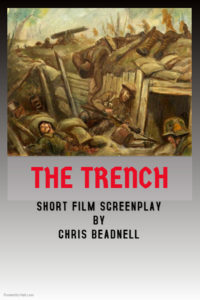THE COST OF WAR (5-page short historical screenplay) by Marnie Mitchell
A waitress fed up with the antiwar protests in 1962 New York City changes her stance once the effects of war hit close to home.
Finishing as Week 5’s top-scoring script for the final week of the Writer’s Tournament was Marnie Mitchell’s impressive historical short, The Cost of War. Under Week-5’s theme of “Winning at Any Cost”, Marnie was assigned the following three criteria items to include in this week’s entry: a COFFEE SHOP, a BAG OF COFFEE GROUNDS and a MODEL, all written under her assigned genre, HISTORICAL.
The story opens in New York City circa 1962, where Pamela, an aspiring model, works as a waitress at the famous Gaslight Cafe, a well-known venue for famous folk artists and poets. She has a crush on a patron and performer there named Bob. Bob performs his latest song he just finished writing. If you’re old like me, you’ll recognize the lyrics and realize that this is Bob Dylan.
The song (“Blowing in the Wind”) is clearly an antiwar/protest song, which seems to turn Pamela off a little bit. You see, her father is in Vietnam, proudly serving his country. And Pamela doesn’t understand what all the protesting is all about.
PAMELA
You know my dad is there, he’s
a Lieutenant. He writes us all
the time and tells us it’s no
big deal. He says it’s really
important that we win. So why
are people trying to end it?
We can’t stop until we win.
After a few days, writing away at the cafe or “bleeding on paper” as Bob tells Pamela earlier, he notices that she hasn’t been around for a few days. It isn’t until the next week that Pamela returns to work. But she returns with a new outlook on the antiwar protests once discovering some tragic news, the effects of war hitting very close to home.
BOB
Hey. Glad to see you back.
Ain’t been the same without you.
What you been up to?
PAMELA
Bleeding on paper.
She then hits the stage, reciting a heartfelt poem documenting the tragedy her family had endured due to the war and how her stance on the protesting had changed. I won’t give away everything, but there is one beautiful excerpt in her poem that really hits hard – “… When you’re willing to win, at any cost – it’s obvious to many, that – you’ve already lost.”
Perfectly capturing the feel of the 60s – a very divisive and turbulent decade defined by the civil rights movement, assassinations and antiwar protests, Marnie Mitchell’s tightly-woven script makes us feel like we’ve gone back in time and experienced Pamela’s pain for ourselves.
BUDGET: Low. There are exterior shots of protesters, but the amount of extras can be cheated on camera. It is a period piece, so 1960’s style wardrobe would be needed. Other than that, it all takes place in one location.
ABOUT THE WRITER: Marnie Mitchell is an award-winning screenwriter and 5-page contest junkie. Due to her addiction, she’s written over 80 shorts, 15 having been produced. Currently she’s working on her 8th feature, an adaptation of a horror short she wrote 10 years ago. Some of her work can be found on her site, BrainFluffs.com. Some of her photography can be seen here: marnzart.wordpress.com. Marnie can be contacted via her website.
Read THE COST OF WAR (5-page short historical screenplay)
Discuss this script on the discussion board
*This screenplay may not be used or reproduced for any purpose including educational purposes without the expressed written permission of the author.
Find more scripts available for production.
About the Reviewer: Michael J. Kospiah is the award-winning screenwriter of critically acclaimed indie-thriller, The Suicide Theory (79% Rotten Tomatoes – available on Amazon Prime, Itunes, Google Play, etc) and 2020’s upcoming Aussie thriller, Rage. His horror feature, They Never Left is currently in development.






